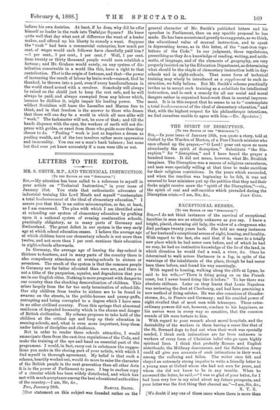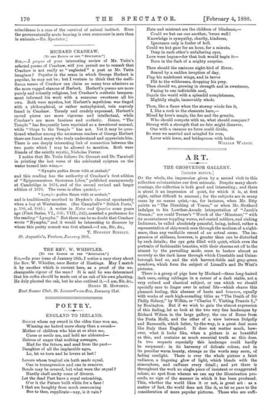EXCEPTIONAL SENSES.
[To THE EDITOR OF THE " SPECTATOH."]
SIR,—I do not think instances of the survival of exceptional faculties in man are as utterly unknown as you say. I know a bright, placid, charming old lady, the widow of a clergyman who died perhaps twenty years back. She told me many instances of her husband's exceptional senses of sight, hearing, and locality. With regard to the last, she said that if he came to a totally new place which he had never seen before, and of which he had no map, he had an instinctive knowledge of the lie of the land, in which direction he would find a road, a river, &c. Once he determined to walk across Dartmoor in a fog, in spite of the warnings of the inhabitants of the place, though he had never been there before, and found his way unerringly.
With regard to hearing, walking along the cliffs at Lyme, he said to his wife,—" There is firing going on on the French coast, but I never heard firing like it before." To her there was absolute stillness. Later on they learnt that Louis Napoleon was reviewing the fleet at Cherbourg, and had been practising a new method of firing salutes. He was also conscious of thunder- storms, &c., in France and Germany ; and his unaided power of sight rivalled that of most men with telescopes. These extra- ordinary powers did not, however, conduce to his happiness, as his nerves were in every way so sensitive, that the common sounds of life were torture to him.
With regard to your remark about moral hospitals, and the desirability of the workers in them having a sense like that of the St. Bernard dogs to find out when their work was specially needed, I think such intimations are far from unknown in workers of every form of Christian belief who go upon highly spiritual lines. I think that probably Roman and English sisterhoods; the Mildmay deaconesses, and the Salvation Army could all give you accounts of such intimations in their work among the suffering and fallen. The writer once felt and obeyed an extremely strong impulse to write a friendly letter to a young man at Oxford whom she had not seen for years, and whom she did not know to be in any trouble. When he answered the letter, he said,—" I was so glad of your letter, for I had been very low in my mind about my future prospects, and your letter was the first thing that cheered me."—I am, Sir, &c., X. Y. Z.
[We doubt if any one of these eases where there is more than
coincidence is a case of the survival of animal instinct. Even the preternaturally acute hearing is even commoner in men than in animals.—En. Spectator.]



































 Previous page
Previous page